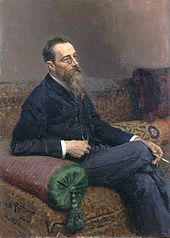According to Shostakovich:
“Rimsky-Korsakov used to say that he refused to acknowledge any complaints from composers about their hard lot in life. He explained his position thus: Talk to a bookkeeper and he’ll start complaining about life and his work. Work has ruined him, it’s so dull and boring. You see, the bookkeeper had planned to be a writer but life made him a bookkeeper. Rimsky-Korsakov said that it was rather different with composers. None of them can say that he had planned to be a bookkeeper and that life forced him to become a composer.”
(Source: Testimony: The Memoirs of Dmitri Shostakovich, as related to and edited by Solomon Volkov. Translated by Antonina W. Bouis. New York: Harper and Row, 1979, p. 65.)

Related: Newberry short commentaries on the great works in art history:
As a composer, let me assure you, composing music is hard — although not, perhaps, a hardship. Beethoven said that “composing music is often as difficult for me as it is for woman to bear a child.” (Men have brainchildren, women have children?) Hearing the melody is not so difficult, if one can “think musically,” which most people cannot. Most people can read, they cannot write. Composing the music to counterpoint and harmonic rules is hard! It is more abstract than mathematics as the result must produce emotion in the human breast. Setting a text is often accomplished with less difficulty than drumming up a tune. Don’t confuse true composition with some home boy at a piano, jiving his heart out. The best composers, Beethoven, Brahms, Bach, Mozart, Haydn, Schubert…sweated out the process AWAY from any instrument. Dramatic composers have more leeway, but then, Mozart was a dramatic composer, and his scores are incredibly close-knit. Compared to Puccini, for example. Rimsky was most famous as an orchestrator, which is another form of “composition.” The utter satisfaction of composing a good piece is reflected in the AMADEUS scene in which Mozart tells the Emperor, “Majesty, there are not too many notes! There are just as many as needed!”